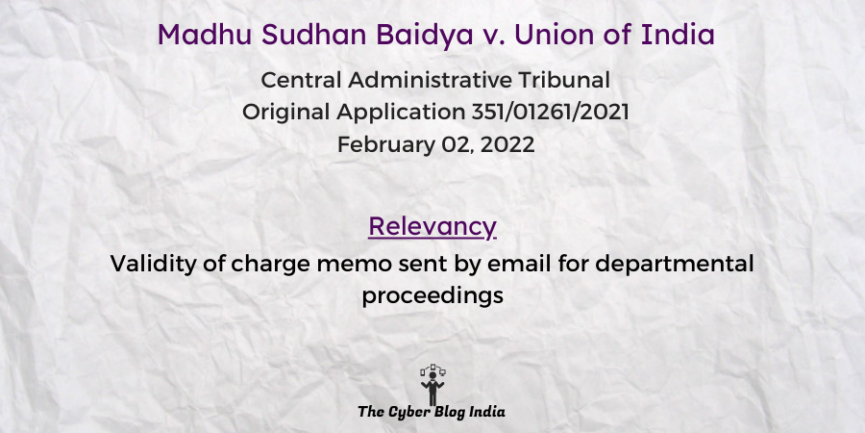Madhu Sudhan Baidya v. Union of India

Madhu Sudhan Baidya v. Union of India
In the Central Administrative Tribunal
Original Application 351/01261/2021
Before Ms Bidisha Banerjee, Member (Judicial) and Dr Nandita Chatterjee, Member (Administrative)
Decided on February 02, 2022
Relevancy of the case: Validity of charge memo sent by email for departmental proceedings
Statutes and Provisions Involved
- The Information Technology Act, 2000 (Section 13)
- The Central Civil Services (Classification, Control and Appeal) Rules, 1965 (Rule 14)
Relevant Facts of the Case
- On April 30, 2021, the date of his superannuation, the applicant was undergoing treatment for COVID-19 at a public health centre.
- The respondents attempted to deliver a copy of the memorandum and article of charges (hereinafter, “the charge memo”) for initiating a disciplinary inquiry against the applicant on April 30, 2021. They pasted a copy of the charge memo on his residential wall and sent a scanned copy to the applicant via email on the same day.
- On May 25, 2021, the Lt. Governor of Andaman and Nicobar issued an order to initiate a departmental inquiry into the charges framed against the applicant. The respondents appointed an inquiry authority under the order and notified the applicant.
- The applicant filed an original application against initiating disciplinary proceedings against him.
Prominent Arguments by the Advocates
- The applicant’s counsel argued that initiating disciplinary proceedings against the applicant was invalid since he did not receive the charge memo before his superannuation. The respondents could not initiate disciplinary proceedings against retired officers. Since the inquiry authority had exceeded its jurisdiction, the tribunal should stay the proceedings.
- The respondent’s counsel argued that constructive delivery of the charge memo was adequate service. The applicant could not claim that he had not received the charge memo since the respondents had delivered it in accordance with the provisions of the Code of Civil Procedure, 1908, before the applicant demitted office. Additionally, the respondent’s counsel argued that sending the charge memo via email followed the Supreme Court’s directions on electronic notice service during the lockdown period.
Opinion of the Bench
- Pasting the charge memo on the applicant’s residential wall was immaterial. He was undergoing treatment at the public health centre.
- The tribunal discerned that the respondents had served the charge memo on April 30, 2021, before the applicant demitted office. Nothing on record shows that the applicant had not received the email.
Final Decision
- The tribunal disposed of the application and directed the respondents to formally serve the charge memo upon the applicant.
Jyotsna Sood, an undergraduate student at the National Law Institute University, Bhopal, prepared this case summary during her internship with The Cyber Blog India in May/June 2024.
